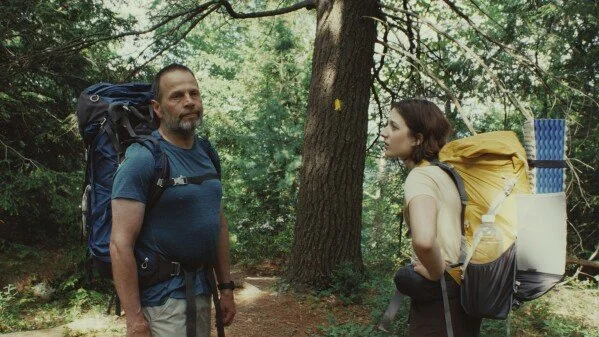GOOD ONE
Directing: B+
Acting: B+
Writing: B
Cinematography: A-
Editing: B
I’m still ruminating on how I feel about the way Good One ends. On the one hand, the final shot is slightly jarring, leaving us with a feeling of an inexplicably abrupt ending. On the other hand, upon reflection, it could be regarded as a metaphor for the three relationships at play through most of the film, set on a forest hiking trip. Either way, in its indelibly subtle way, it’s really kind of a bummer.
The plan, originally, was for it to be a foursome on this trip: Chris (James Le Gros) and his teenage daughter Sam (Lily Collias); Chris’s oldest friend Matt (Danny McCarthy) and his teenage son Dylan. Things are immediately thrown off when Dylan, a resentful son of divorced parents, refuses to come, leaving only Chris, Sam and Matt to go on the trip.
There’s a key scene somewhere in the middle of this film, in which Sam observes that Matt had been eating snacks in his tent, telling him he probably shouldn’t do that. Chris catches wind of this and flies off the handle, framing it as being “reckless” with his teenage daughter, given how far and wide a bear can be attracted by food. It’s the one time Chris exhibits anything close to fierce protectiveness of his daughter.
But then something happens later, something vaguely creepy that sits somewhere in the space between a gray area and something some might find genuinely triggering. In this instance, Chris is either dismissive or pleads for Sam to let it go. There seems to be a slight connection here to when three young men who are also hiking in the area take it for granted that it’s fine for them to set up camp right next to them. We never see any evidence that these three young dudes pose any threat, but that is beside the point: when Sam gives even the slightest hint that this makes her feel uncomfortable, Chris’s immediate response is to tell her it’s fine. There may be a minor theme building here.
Good One takes a lot of time to get to any details this concrete, as we spend the better part of an hour doing little more than just hanging out with this trio. This film deals almost exclusively in nuance and subtlety, and only through keenly observed detail do we register that both Chris and Matt have some form of arrested development, and Sam has more instinct for both maturity and survival than either of them. As written by writer-director India Donaldson, there is intention behind every single thing we see onscreen, how benign a huge amount of it seems notwithstanding.
Matt is a little difficult to figure out, both as a person and as a created character. He can be a little flaky and boneheaded, overpacking his backpack or hiking in denim jeans or forgetting his sleeping bag. This lends him a bit of shaky ground for plausible deniability, when it comes to the way things turn between him and Sam later in the film. It’s the kind of thing that some might find up or debate: is this man in any way predatory, or is he just a clueless dipshit?
How you respond to this may very well depend on your own personal experiences. I, for one, am leaving toward clueless dipshittery as a cover for predation. It should be stressed, however, that Good One never takes an explicit stance on this matter.
Good One is about as “indie” as an indie movie is going to get, and it certainly won’t be for everyone. To anyone but the keenly observant, nothing of note even happens in this movie until roughly halfway through, until which time it seems we are just watching this trio hike through the forest. Matt is genuinely saddened by his son’s refusal to come on the trip with them, and this is something Sam notices more effectively than her dad—Matt’s best friend—does. This contributes to a sense of empathy that Donaldson effectively creates, for all three of these characters. It’s also a big part of the tricky emotional navigating we have to do when Matt says something to Sam that objectively crosses a line, but without crystal clear intent.
It’s not often a film challenges us in such a specific way, which affords Good One a unique kind of respect. I must admit I don’t know a lot of people who would be into that, as it requires the ability to appreciate pointed ambiguity in art, the kind that diminishes the pleasure or fun in it. I keep thinking about the pivotal moment in this film, but I’m not sure I want to be. I’m left with a deep appreciation for a cinematic accomplishment I would also like to move on from.
She’s told she’s a good one, but not by the right one.

